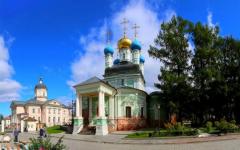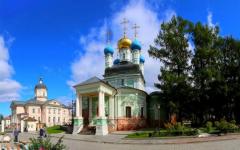Russian Academy National economy And civil service under the President of the Russian Federation (RANEPA) was created by Decree of the President of the Russian Federation dated September 20, 2010 No. 1140 by joining the Academy of National Economy under the Government of the Russian Federation (ANH, year of creation - 1977) of the Russian Academy of Public Administration under the President of the Russian Federation (RAGS, year of creation - 1991 ), as well as 12 other federal state educational institutions.
The merged academies have earned a reputation as leaders in training the country's top management personnel for both business and government agencies. Since its creation in 1977, the Academy of National Economy has firmly established itself as the “forge of ministers.” With the beginning of economic transformations in Russia in the 90s. XX century There was a change in the strategic model of the Academy: from the training of nomenklatura personnel, we moved to business education, becoming an educational institution offering all types of educational services for areas of management. RAGS, founded in 1991, has taken the position of a leading educational institution preparing managers for the state and municipal service system.
The newly formed Academy under the President of the Russian Federation - RANEPA - is the largest socio-economic and humanitarian university in Russia and Europe, rightfully occupying the top lines in all national rankings. By Decree of the President of the Russian Federation dated July 7, 2011 No. 902, the Academy has the right to independently establish educational standards and requirements for the higher education programs it implements. vocational education.
The Academy implements basic professional educational programs– more than 80 bachelor’s programs, 8 specialty programs, more than 130 master’s programs. 7 programs of secondary vocational education are being implemented.
The Academy has developed and implements more than 200 programs of additional professional education. About 30 percent of these programs are updated annually.
Postgraduate and doctoral studies are carried out in 10 areas of science, and there are 20 dissertation councils.
The Academy has developed unique training programs for civil servants for federal authorities and authorities of the constituent entities of the Russian Federation.
RANEPA is currently one of the leaders in training top-level managers for Russian enterprises and organizations. Over a third of MBA (Master of Business Administration) students in the Russian Federation are students of the Academy.
Most MBA and EMBA (Executive Master of Business Administration) programs of RANEPA are accredited by the most prestigious accrediting associations in the world.
The Academy became one of the initiators of introducing the system Russian education MPA (Master of Public Administration) programs. The purpose of these programs is to meet the personnel needs of government agencies.
The Academy has extensive international connections with leading foreign universities. The Academy not only sends Russian students abroad, implements joint programs with leading universities, but also trains foreign students.
The RANEPA library collection consists of more than 7 million books; it also includes the State Duma Library (established in 1906) and the famous Demidov Library. The Moscow campus has over 315 thousand square meters. m area. The total area of the branch network exceeds 451 thousand square meters. m.
schedule Operating mode:
Mon., Tue., Wed., Thu., Fri. from 10:00 to 17:00
Latest reviews from RANEPA
Anonymous review 05:10 11/01/2019Anonymous review 18:21 06/26/2019
Horror. I’m just an applicant and came to submit documents. What kind of attitude?!? If I came without my mother, then I’m shit? Horror! They just ruined the mood. These people, the walls - everything looks perfect, but what’s inside is f****t. I wanted to enter the Faculty of Journalism, only on a budget, since my parents did not want to pay for my education. And what? Because of this I was humiliated!! Thank you
RANEPA Gallery



general information
Federal state budget educational institution higher education "Russian Academy of National Economy and Public Administration under the President of the Russian Federation"
Branches of RANEPA
RANEPA Colleges
- College of the Russian Academy of National Economy and Public Administration under the President of the Russian Federation - in Kazan
- College of the Russian Academy of National Economy and Public Administration under the President of the Russian Federation - in Omsk
License
No. 02787 valid indefinitely from 12/07/2018
Accreditation
No. 02728 valid from 12/13/2017
Monitoring results of the Ministry of Education and Science for RANEPA
| Index | 2019 | 2018 | 2017 | 2016 | 2015 | 2014 |
| Performance indicator (out of 5 points) | 4 | 5 | 6 | 6 | 6 | 4 |
| Average Unified State Examination score for all specialties and forms of study | 70.77 | 68.84 | 68.23 | 71.46 | 66.45 | 71.94 |
| Average Unified State Examination score of those enrolled on the budget | 91.36 | 91.4 | 89.43 | 88.30 | 88.04 | 90.05 |
| Average Unified State Examination score of those enrolled on a commercial basis | 67.58 | 65.26 | 65.14 | 68.38 | 62.35 | 69.07 |
| Average in all specialties minimum score Unified State Exam for full-time students | 43 | 42.35 | 41.62 | 52.52 | 49.21 | 51.79 |
| Number of students | 18889 | 18364 | 18211 | 17412 | 15400 | 14864 |
| Full-time department | 14525 | 14005 | 13799 | 12243 | 11393 | 8887 |
| Part-time department | 1847 | 2086 | 2206 | 2097 | 1687 | 2088 |
| Extramural | 2517 | 2273 | 2206 | 3072 | 2320 | 3889 |
| All data | Report | Report | Report | Report | Report | Report |
University Reviews
The best law universities in Russia according to the international information group "Interfax" and the radio station "Echo of Moscow"
The best financial universities in Russia according to the magazine "FINANCE". The rating is based on data on the education of financial directors of large enterprises.
TOP 5 universities in Moscow with the highest and lowest USE passing scores for the field of study "Jurisprudence" in 2013. Cost of paid training.
Results of the 2013 admissions campaign to specialized economic universities in Moscow. Budget places, USE passing score, tuition fees. Profiles of training of economists.
About RANEPA
Structure of RANEPA
Russian Presidential Academy of National Economy and Public Administration – largest university in Russia, producing young specialists for all management areas. RANEPA is one of the youngest and most promising educational institutions; the decree on its creation was signed in 2010. The Academy included:
- 12 regional institutes federal significance;
- Academy of National Economy;
- Russian Academy of Public Administration.
Branches of RANEPA were opened in cities such as Novosibirsk, Chelyabinsk, Arzamas, Nizhny Novgorod, Rostov-on-Don and others; in total, 68 branches operate in the country under the auspices of the Russian Presidential Academy of National Economy and Public Administration on the territory of 58 subjects of the Federation. Total number There are more than 200 thousand students across the country, with 35 thousand of them studying full-time.
RANEPA is not only the largest higher education institution in Russia specializing in the humanities, but also a significant competitor for leading European institutions in the field of economics and sociology. The popularity of the academy is emphasized by its top places in national rankings and various statistics.
Teachers, students and the education system at RANEPA
Today, more than 4,500 thousand students study 82 specialties in the Moscow branch of RANEPA. A dormitory is provided for students. The structure of training at the academy is characterized by significant diversity. Thus, students are offered:
- 26 specialist training programs;
- 22 bachelor's degree programs;
- 14 master's degree programs;
- 31 programs for students wishing to receive secondary specialized education.
The creation and updating of training courses occurs annually; today the university has developed and implemented about 700 additional training programs. For those who want to continue the process of comprehending new truths, postgraduate and doctoral studies are available. In the first case, students can choose from 65 scientific specialties, and in the second - among 25.
RANEPA has an impressive teaching staff. Students are taught by more than 3,000 highly qualified teachers, 700 of whom have doctoral degrees and professors.
Training at RANEPA is truly unique. This university provides not only classical basic skills for young students, but also a large-scale development of a project about continuing education civil servants. The innovative idea was first embodied within the walls of the academy. Its main meaning boils down to continuous training and support for workers in this management sector, retraining, advanced training and various consulting activities.
RANEPA integrates global experience
RANEPA specializes in training managers of the highest class; graduates of the university are not inferior in their knowledge to students of leading foreign institutes. Training is conducted according to the prestigious international MBA (Master of Business Administration) and EMBA (Executive Master of Business Administration) programs, which are relevant in global business. RANEPA also became the first university to teach the MPA (Master of Public Administration) system. This innovative approach makes it possible to provide the Russian government with highly qualified personnel.
A business incubator was implemented on the basis of the academy, which was rated by the world community, namely, in the ratings of Forbes magazine, as the most advanced and successful in Russia.
RANEPA pays great attention to interaction with foreign colleagues. Thus, experience is exchanged with famous world universities, including Harvard and Stanford. Cooperation is based on mutually beneficial conditions, the academy sends its students on internships, accepts students from abroad for training, and develops common projects.
Goals, objectives and operating principles of the university
Today, RANEPA faces the following most important tasks:
- training of highly qualified personnel for government and public structures;
- conducting research in the social and economic spheres;
- development scientific works;
- providing scientific and expert assistance to authorities;
- establishment educational standards, control and requirement for their implementation.
The Russian Presidential Academy of National Economy and Public Administration adheres to the following training principles:
- continuity (initial training, advanced training, retraining);
- individual approach (students can create their own program from a specific set of module courses);
- use of international experience in training (exchange student programs, internships);
- innovative teaching methods (business games, simulators, practical lessons);
- The basis of training is obtaining practical skills.
Where to go, which higher education institution is better - this current issues for applicants. When choosing a university, first of all you should think about what you would like to do in the future, what place to occupy in life. In pursuit of managerial, analytical and scientific activity It’s worth paying attention to RANEPA (transcript: Russian Academy of National Economy and Public Administration).
History of the university
At the end of the 70s, the Academy of National Economy under the Council of Ministers of the USSR began to function in the capital of Russia. The purpose of this institution was to improve the skills and retraining of management personnel. IN Soviet years Heads of various organizations, specialists and heads of management bodies studied here. In 1988, the rector decided to open an educational institution on the basis of the Academy - the Higher Commercial School.
In 1992, some changes occurred. The establishment received a new name. From now on, the institution began to be called the Academy of National Economy under the Government of the Russian Federation. In 2012, dramatic changes took place. Several state universities joined the Academy, in accordance with the Presidential Decree. As a result, a new higher education institution emerged with rich history‒ Russian Academy of National Economy and Public Administration under the President of the Russian Federation (abbreviated name RANEPA).
The university is currently
The Presidential Academy is considered the leading one in Russia. It trains in-demand specialists: economists, lawyers, journalists, future leaders, managers, and civil servants. Training is very effective because it includes new educational technologies. The programs include active learning methods (business games, computer simulations, “situational cases”) that allow you to gain various practical skills.
The main Presidential Academy (RANEPA) is located in Moscow. However, this does not mean that people planning to enroll here should go to the capital of the country. This state educational institution has a huge number of branches. There are more than 50 of them. All of them are dispersed throughout the Russian Federation.
Structure of the educational institution
When considering a university, it is worth paying attention to its structure. The State Presidential Academy includes several faculties - educational, scientific, administrative structural divisions who train students in various specialties. Some faculties at RANEPA function as institutes.
So, the structure of the academy includes the following divisions:
- Institute of Management RANEPA;
- Higher School of Corporate Management;
- Faculty of Economics;
- and finance;
- institute social sciences and etc.

Bachelor's and specialist's degrees
RANEPA (Moscow) has the widest selection of undergraduate programs. Applicants are offered various directions in which they can study full-time, part-time, part-time, part-time (information about forms of study should be checked with the admissions committee of the head university or branch):
- Applied Informatics;
- psychology;
- economy;
- management;
- municipal and state administration;
- international relationships;
- personnel Management;
- social sciences, etc.
The State Presidential Academy (RANEPA) also invites you to the specialty. It is represented by four directions. This " Economic security", "Customs", "Psychology of official activities", "Ensuring national security (legal)". Training is carried out on a full-time basis.

Master's degree at RANEPA
Having any person can try their hand at enrolling in a master’s program at the Presidential Academy, a state educational institution. This is the second level of higher education. The university provides training in 17 areas (“Economics”, “Jurisprudence”, “Municipal and State Administration”, “Government Audit”, “Foreign Regional Studies”, etc.).
A master's degree at RANEPA (Moscow) allows you not only to extend your student life for a couple of years. It provides an opportunity to expand your knowledge in your existing specialty or gain another profession. A master's degree opens up new career prospects, because some positions are not filled by people with a bachelor's degree.
At the state academy for a master's degree, you can choose any form of study that is most convenient for you (full-time, part-time, part-time). It is also worth noting that in some areas you can study for free at the expense of the state budget. On budget places applicants are admitted by passing a competition.

Further education
The Presidential Academy invites people who want to devote their future life to scientific activity to graduate school. Preparation is carried out in several areas:
- jurisprudence;
- economy;
- religious studies, philosophy and ethics;
- sociological sciences;
- information librarianship and media;
- psychological sciences;
- political sciences and regional studies;
- cultural studies;
- archeology and historical sciences;
- Informatics and computer technology.
Postgraduate programs include:
- Studying disciplines (modules). For each of them, you ultimately pass either a test or an exam.
- Passing teaching practice. This stage of training allows you to gain new skills and professional experience.
- Conducting research work. This stage of training is supervised by a supervisor.
- Passing the state final certification.
People who complete graduate school receive a diploma with the qualification “Researcher.” Teacher-researcher."

Admission to RANEPA
To enter the Russian Academy, you must select the faculties and institutes you are interested in, submit a package of documents (passport, application, certificate or diploma, photographs, papers serving as confirmation individual achievements). Selection committee takes into account Unified State Exam results(for each direction there are specific exams taken into account by the university). Those persons who do not have them take entrance examinations at the academy in the form of written tests.
In order to test their existing knowledge, applicants to the master's program are assigned an exam in a specialized discipline. In some areas, the Russian Academy of National Economy provides for passing additional tests and foreign language.

on budget
Many applicants entering RANEPA, branches of the university, apply for budget places. However, their number in the educational institution is limited. To study at the expense of the federal budget, you must pass a competition. To do this, you should prepare well for the Unified State Exam or entrance examinations in order to score as many points as possible.
RANEPA statistics show that the best applicants with good knowledge are admitted to budget places. In 2016, the passing score was quite high. Thus, in the direction of “Public Relations and Advertising” it amounted to 277 points (the sum of three Unified State Examinations or the results of entrance tests), in the direction of “ International relationships‒ 272 points.
Frequently asked questions from applicants
People who have chosen RANEPA, branches of this university, are often interested in whether it is possible to somehow get to know the academy better, find out Additional information about your favorite faculties and institutes. Educational institution holds periodically. At these events you can find out the conditions for admission and ask questions.

Applicants also often ask if the Russian Academy has dormitories in Moscow where nonresident students can live in the future. The university has a hotel and residential complex. There are also several dormitories. Move-in typically begins at the end of August. One thing is required from students - to enter into a rental agreement. IN otherwise The university refuses to provide a place in the dormitory.
| Russian Academy of Public Administration under the President of the Russian Federation (RAGS) |
|
|---|---|
| Former names | Academy of Social Sciences under the CPSU Central Committee Russian Academy of Management |
| Year of foundation | 1946 |
| Year of reorganization | 2010 |
| Rector | Vladimir Alexandrovich Mau |
| Location | Russia Russia, Moscow |
| Legal address | 119606, Moscow, Vernadsky Avenue, 84 |
| Website | rags.ru |
Russian Academy of Civil Service (RAGS) under the President of the Russian Federation - a higher educational institution that existed in 1946-2010.
The Academy performed the functions of an educational, methodological, scientific, information and analytical center on the problems of civil service in the Russian Federation, as well as managing the system of retraining and advanced training of civil servants.
Encyclopedic YouTube
1 / 5
About the Academy, 2018
Instructions for registering for the RANEPA Olympiad and completing the correspondence stage are new
THE MOST IMPORTANT IDEAS ABOUT RIGHT THINKING | ARK OF IDEAS
Subtitles
Story
USSR
Academy of Social Sciences under the Central Committee of the CPSU- higher party educational institution of the USSR. Created in Moscow on August 2, 1946 to train theoretical workers of central party institutions, the Central Committee of the Communist Parties of the Union Republics, district and regional committees of the CPSU (b), as well as university teachers, researchers at research institutions and scientific journals.
Specialists were trained in the history of the CPSU, general problems of political economy, industrial economics, economics Agriculture, world economics, dialectical and historical materialism, criticism of modern bourgeois philosophy and sociology, scientific communism, history of Soviet society, history of the international communist workers and national liberation movement, literary criticism, art history and journalism. In 1964, it was created under AON.
postgraduate students of Candidate of Sciences.
The Academy of Social Sciences trained postgraduate students for a period of 3 years. By the end of the third year of study, graduate students defended dissertations for the degree of candidate of science. By order of the President of the Russian Federation B.N. Yeltsin No. 72-rp dated November 5, 1991, the Academy of Social Sciences was transformed into the Russian Academy of Management, whose rector was appointed prof. Tikhonov Rostislav Evgenievich. The academy has undergone profound transformations, both in personnel and in content. educational process. The main objectives of the Academy are defined as: - postgraduate training, retraining and advanced training of management personnel; - development of new technologies government controlled; - conducting scientific examinations of government programs and projects; - studying and forecasting the needs for management personnel; - analytical and information support for public authorities and management. In accordance with these tasks, under the leadership of the rector, R. E. Tikhonov, the program “Optimization of structures and mechanisms of federal and regional governance” was developed and partially implemented, which was and remains the most pressing task in the field of public administration.
On September 20, 2010, President of the Russian Federation D. A. Medvedev, by Decree No. 1140, united the Russian Academy of Public Administration under the President of the Russian Federation and the Academy of National Economy, thereby creating the Federal State Budgetary Institution of Higher Professional Education "Russian Academy of National Economy and Public Administration under the President of the Russian Federation" .
On September 23, 2010, by order of the Chairman of the Government of the Russian Federation V.V. Putin No. 1562, V.A. Mau was appointed rector of RANEPA. A. M. Margolin was appointed acting rector of the RAGS for the period of reorganization.
On December 29, 2010, by Decree of the Government of the Russian Federation No. 1178, the Charter of the federal state budgetary educational institution of higher professional education “Russian Academy of National Economy and Public Administration under the President of the Russian Federation” was approved.
About the Academy
The Russian Academy of Public Administration under the President of the Russian Federation was established by Decree of the President of the Russian Federation of June 6, 1994 No. 1140. In accordance with this Decree, the Academy is entrusted with the functions of an educational, methodological, scientific and information-analytical center on problems of public service in the Russian Federation.
On December 25, 2007, the former president-rector Vladimir Konstantinovich Egorov was elected rector of the Academy.
The Academy coordinates the educational, scientific, information-analytical and methodological activities of federal state educational institutions that train state civil servants specified in the annex to Decree of the President of the Russian Federation of November 10, 2006 No. 1264.
The Academy trains employees of federal government bodies and administration, government bodies of the constituent entities of the Russian Federation, municipal employees, representatives of legislative, executive and judicial authorities, employees of commercial structures with higher education. In addition, the Academy runs special advanced training courses for senior clergy of the Russian Orthodox Church
Under the second higher education programs, training is provided in the specialties “State and Municipal Administration”, “Jurisprudence”, “Labor Economics”, “Crisis Management”, “National Economics”, “ World economy", "Taxes and Taxation", "Organization Management", "Psychology", "Human Resource Management", "Political Science", "Sociology", "History", "Documentation and Documentation Management", "Applied Informatics in State and Municipal Administration " Within the framework of these specialties, economists, lawyers, sociologists, psychologists, management specialists, etc. are trained.
Six specialized master's programs provide admission to studies in the field of Economics.
In accordance with Decree of the President of the Russian Federation of December 28, 2006 No. 1474 “On additional professional education of state civil servants of the Russian Federation,” the Academy is taking measures to expand retraining and advanced training of civil servants.
The most important area of additional professional education for civil servants and management personnel for business is the implementation of the Master of Public Administration (MPA) and Master of Business Administration (MBA) programs together with foreign partners.
In 2008, the Academy opened its doors for the first time to graduates of schools and colleges, offering training in educational programs of the first higher professional education in the specialties “Psychology” and “Jurisprudence”, bachelor’s degrees “Economics” and “Management”.
The Academy trains highly qualified scientific and pedagogical personnel through full-time and part-time postgraduate studies, doctoral studies and forms of competition. Defense of doctoral and master's theses is carried out in 16 dissertation councils.
The Academy has 20 departments and other structural divisions.
The Academy has a modern material base for the educational and research process. The complex of its buildings, located in the south-west of Moscow, includes: two educational buildings with total area 120 thousand sq. m; two hotels with 1,300 single and double rooms; classroom fund of more than one hundred classrooms, including the Large Assembly Hall with 910 seats and the Small Hall with 400 seats (many auditoriums are equipped with modern technical means); its own library, which has been formed over decades, the holdings of which amount to about two million items in Russian and foreign languages.
(1959-1965)
Management
- Department for Coordination of Educational Activities
- Postgraduate and doctoral studies
- Executive Directorate of the Council of Rectors of Federal State Educational Institutions
- Computer technology and information systems
- Business Management
- Financial and economic
- Extrabudgetary activities
- Accounting and financial control
- Economic
- Engineering and technical
- Capital construction
- Social and household service"Academservice"
- Logistics
- Legal Department
Centers
- Education Quality Assurance Center
- Information and Methodological Center for Technologies of State and Municipal Administration
- Center for Experimental Educational Programs
- Monitoring of public administration and law
- International relations
- Problems of migration policy
- Sociological
- Situational
- Center for Investment and Innovation
- Publishing
- Center for Career Planning and Forecasting
- Medical
- Business
- Editorial board of the magazine "Public Service"
- Cultural
- Country educational and health complex "Solnechny"
Accreditation, No. 1262-06 July 4, 2012
The Federal State Educational Institution of Higher Professional Education "Russian Academy of Public Administration under the President of the Russian Federation" is considered a leader in training specialists for public service in government agencies and municipal administration. Unfortunately, most managers do not have proper training, so government orders are not fulfilled. Management staff need appropriate training. RAGS is creating a methodology for training management personnel for the state machine. The Academy provides advanced training and retraining services for employees holding management positions.
Educational programs at RAGS
RAGS specializes in training personnel for the civil service and municipal administration. Accordingly, curricula include information on personnel management, organizing the productive work of various structures and other subjects, knowledge of which can increase the productivity of a manager. The institute trains both young people and established professionals who need to retrain to improve their leadership skills or improve their qualifications. Moreover, the effectiveness of training does not depend on the age and position of students. All specialists undergoing training will be able to find useful information.
Scientific activities of the institute
To successfully train personnel for the government, the institute is constantly improving its educational programs. That is why he is in high positions in. Successful activities are ensured by huge analytical and computing systems that collect up-to-date information, classify and analyze it. The results of research and sociological surveys are used in the process of teaching students, thanks to which the most current information is taught and used at the university best methods training of management personnel.
The strategic role of the Civil Registry Office
RAGS trains the country's leading personnel, from whom the future of Russia will depend, starting with district administrations and ending with ministries. Teachers of the Russian Academy of Public Administration under the President of the Russian Federation have a responsible mission to prepare the future elite of Russia. If the professors of the institute cannot teach their students proper management of personnel and state property, then this may lead to sad consequences. Therefore, the management of the institute carefully selects a teaching staff that can cope with the mission entrusted to it.









